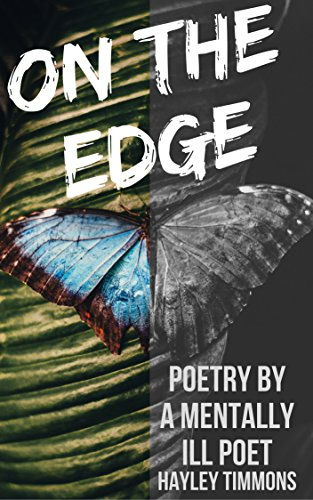On the Edge: Poetry by a Mentally Ill Poet by Hayley Timmons
- Angie Gallion
- Aug 4, 2017
- 3 min read

I am not a poet. Poetry to me, is like the rending of a soul. I do not profess to know what makes good poetry and I do not profess to be any sort of authority. With all of my reviews, I am simply sharing my very personal responses to a piece of work. Several weeks ago I was invited to The Emerging Authors Showcase at the LaGrange Memorial Library and I met several new authors as well as saw some authors I already know, including David Allman, Author of Acorns to Wheat, Lee St. John, author of the She's a Keeper series, and Janet Hogan Chapman, author of Madam May. I was so happy to see them, out promoting their books, which I enjoyed reading in their turn. Both Chapman and St. John have new books out this year and Allman is working on a sequal to his epic history. Writers write, it is true, and it is nice to see those writers out there publishing, fullfilling their ambitions without any help.
Hayley Timmons is a poet, and by her own admission, mentally ill. We had a quiet conversation as the Emerging Authors event was closing down. She is a fascinating woman who has seen darkness from an angle most of us can't even imagine. As I mentioned, I'm not a poet, I don't know what makes for good poetry in any academic platform, and to say I enjoyed this book would be wrong. I didn't enjoy it, I experienced it. She left me with chills walking down my spine and opened my eyes to the true horror of undiagnosed mental illness. This is not a book you read to feel happy. It is more profound than that. This is a testament to survival. Timmons is a fighter, and now that she has a named opponent she is better equipped to wage the war. Her poetry is dark, but not opaque. So often poetry leaves me trying to understand what has been said, and why. That is not the case here. Timmons poems are emotionally complex but they don't pretend to be anything more than the filleting of a soul, the opening of a heart, the sorting of a mind. I understood from the very first poem exactly what I was dealing with. I felt the tragedy of feeling unworthy, of feeling the epic "mistake," I felt the heartbreak of loss. It was a very emotional ride and Timmons shares it all, laying her scars face up and forcing us to see. Mental illness is real, and undiagnosed mental illness is deadly. There is no shame in this book. This is a book about triumph. This book is about recognizing the fragility of the human mind, which sometimes is wired a different way.
When I was a teen, cutting was a quiet thing, something a handful of kids did that nobody talked about. Cutting is a theme that runs through my writing. Is it a cry for help, or is it just a pressure release? I don't know. Is it an early attempt at suicide, the testing of a site the gauging of blades and depths? I don't know. Timmons does. She knows. She was there and she is confronting her demons and vowing to find a better way, a way that produces and doesn't destroy. She has accomplished that, in this book. If you have seen the darkness you will understand. If you have danced with sharp objects, you will understand. If you have lost a grandmother or a pet, or a love, you will understand. Timmons stands unbeaten at the end of this book, prepared to continue her own private war.



Comments